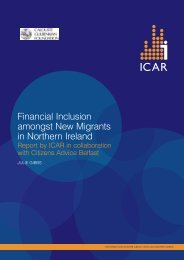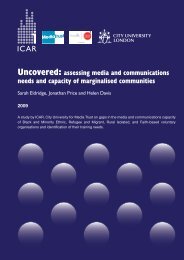Slides from this seminar are available here - ICAR
Slides from this seminar are available here - ICAR
Slides from this seminar are available here - ICAR
- No tags were found...
You also want an ePaper? Increase the reach of your titles
YUMPU automatically turns print PDFs into web optimized ePapers that Google loves.
From research objects toresearch subjects: Reflections onthe politics of researching asylumVicki SquireThe Open UniversityDepartment of Politics and International StudiesCentre of Citizenship, Identities and Governance
Researching asylum: A thornypolitical issue• Asylum: a thorny political issue• Highly charged (racism, nationalism, economics)• Multiple investments (political and public; global,European, national, local)• Researching a thorny political issue• C<strong>are</strong>ful yet genuine representation• Respecting research subjects• Critical diagnosis and critical intervention
Researching asylum:Addressing an exclusionarypolitics• How to do research that intervenescritically yet c<strong>are</strong>fully in addressing theexclusionary politics of asylum?• Diagnosing an exclusionary politics• Intervening in an exclusionary politics– Objectivist interventions– Subjectivist interventions– Political interventions• Drawing on different projects throughout talk
Diagnosing an exclusionarypolitics II: Managed migration• A progressive approach?• Opening up new migration routes (against purerestriction)• ‘Objective’ method for choosing between migrants• Problems with ‘managed migration’• Migration – designated routes limited; increasingtemporariness; precarity of ‘unwanted’ migrants• Asylum – ‘bogus’ versus ‘genuine’; increasingemphasis on provision of protection elsew<strong>here</strong>;legitimate versus illegitimate routes to protection– Plays into securitisation and criminalisation of asylum
Intervening in an exclusionarypolitics I: Objectivistinterventions• Objectivism:• reality exists independent of our understanding of it• research is about gaining independent knowledgeof a given phenomenon• Asylum as an object of research:• Emphasis on numbers/statistics– Figures of asylum seekers; costs of asylum system• Measurement of policy outcomes– Effectiveness of policies in meeting specified aims– Costs/benefits of different policies
Intervening in an exclusionarypolitics II: Problems withobjectivist interventions• Critical objectivist interventions• Producing new statistics• Assessing policies in their own terms• Problems with objectivist interventions• Risk getting caught up in ‘number games’?• Risk reproducing dominant ‘gaze’ on asylum (<strong>from</strong>the perspective of the ‘host’ community)
Intervening in an exclusionarypolitics III: Subjectivistinterventions• Subjectivism:• Knowledge is the product of our consciousness• Research is about presenting subjectiveunderstandings of a given phenomenon• Asylum seekers as subjects in research• Emphasis on the experiences of asylum seekers– Asylum seekers as service users (action research)• Emphasis on integrating asylum seekers within t<strong>here</strong>search process– Asylum seekers as researchers (participative research)
Intervening in an exclusionarypolitics IV: Problems withsubjectivist interventions• Critical subjectivist interventions• Produce a different ‘gaze’ on asylum• Empowerment of asylum seekers• Problems with subjectivist interventions• Limited ability to challenge stated policy aims?• Asylum seekers reduced to asylum seekers ratherthan seen as people with a wider repertoire ofexperiences?
Intervening in an exclusionarypolitics V: Political Interventions• Political interventions:• Knowledge is always ‘knowledge in context’– Produced knowledge intervenes in a field that is alreadypoliticised/depoliticised– Hence the need for diagnosis as well as intervention• Research is about considering alternative ways ofbeing– Focus on contestations of existing narratives and/orpractices (political focus over focus on objective facts orsubjective experiences)– Focus on the constitution of subjectivities that exceed ortranscend the dominant ‘gaze’ on asylum (focus onsubjectivities over focus on research objects/subjects)
Intervening in an exclusionarypolitics VI: Political Interventions• Asylum seekers as active subjects?• Asylum seekers <strong>are</strong> social actors, occupyingdifferent positions– Gendered, racialised, sexualised subjectivities– But also located within specific social formations(presence within a locale: e.g. religious, educational andemployment-based engagements)• Asylum seekers <strong>are</strong> active subjects who participatein various ways within different social formations– Subject position as asylum seeker is distinctive and haslegal implications as a status that limits one’s ability todemand certain rights– However, <strong>this</strong> status is not fixed nor is the social positionof asylum seeker all-consuming
Intervening in an exclusionarypolitics VII: PoliticalInterventions• Asylum seekers as political subjects• Distinctiveness of ‘the refugee’ as a political figurehas been theorised in detail– The refugee shows the limitations but also is central tothe operation of an international system of nation-states• W<strong>here</strong> does the asylum seeker fit into <strong>this</strong>?– Asylum seeker as scapegoat figure:» Scapegoats for the failures of political community(i.e. of the state’s failure or inability to provide theprotections that <strong>are</strong> demanded of it)» Scapegoats who serve to mask or obscure theinevitable ‘excesses’ of a contained or territorialpolitical community
Intervening in an exclusionarypolitics VIII: PoliticalInterventions• Asylum seekers as political subjects -cont.• How can we produce knowledge that challenges<strong>this</strong> articulation of asylum?– Approach asylum seekers as people with multiplesubjectivities who occupy various subject positions– Examine the distinctive claims and enactments of asylumseekers across the various sites or locales that theyengage– Draw out narratives and practices that contest dominantarticulations of asylum seekers as ‘unauthorised’ and‘unwanted’– Focus attention on subjectivities that do not fit thedominant ‘gaze’ (asylum seekers and their ‘allies’)
Conclusion: Re-thinking asylum• How does a political intervention facilitatea re-thinking both of what asylum meansand of what it means to research asylum?• A political intervention stresses the importance ofcritical diagnosis as well as c<strong>are</strong>ful intervention• The main objective of a political intervention is tochallenge the dominant ‘gaze’ on asylum• A political intervention goes beyond viewingasylum seekers as ‘active subjects’ toward thinkingof them as ‘activist subjects’ who act in solidaritywith others• A political intervention potentially challenges someof our basic assumptions about political community
















